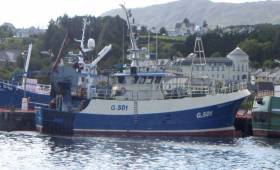Displaying items by tag: Oileán an Óir
Report On Trawler Toxic Fumes Deaths Highlights Wider Safety Issues
#MCIB - Two fishing crew died after exposure to toxic gases that were not detected within their trawler's refrigeration system, according to the official findings on the incident in Killybegs a year ago.
The new report from the Maritime Casualty Investigation Board (MCIB) also recommends the issue of a Marine Notice warning fishing crews of the hazards of toxic gases within closed spaces on board their vessels.
As previously reported on Afloat.ie, the tragedy occurred when the two men were cleaning refrigeration tanks on the fishing vessel Oileán an Óir in Killybegs Harbour on Monday 24 August 2015.
When one man was overcome by fumes upon entering the port-side tank, his colleague was similarly overcome when going to his aid. Both were rescued from the tank and removed to hospital for treatment, but later died as a result of the inhalation of lethal levels of hydrogen sulphide gas.
The MCIB report determined that the gas, a common byproduct from the breakdown of organic matter such as fish, was held in solution within water that had not been fully flushed out of the trawler's refrigeration system after the end of the pelagic fishing season five months prior.
When the two crew members ran harbour water through the system to flush out the tanks, the gases released remained in the confined spaces.
The report highlights that while the trawler's refrigeration system lacked gauges or sensors to detect toxic fumes, it was also standard practice for the crew to enter the tanks for various purposes, such that the first crew member "would not have perceived the danger that this action posed to him or the repercussions to the safety" of his crewmate.
"Fatalities due to enclosed space entry is an issue of considerable concern" within the merchant shipping sector, the report adds, despite the hazards of toxic gases in such spaces being "well known in the broader marine industry".
The full MCIB report on the Oileán an Óir incident is available to download below.
























































